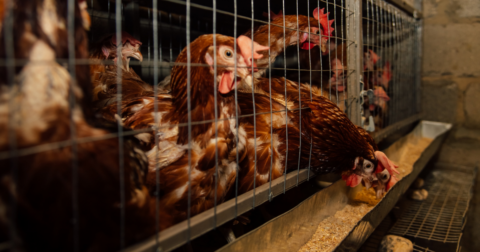Investigation
Homesteading Is a Viral Trend, but ‘Butchery Gone Awry’ Is Its Dark Side
Food•6 min read
Reported
These tactics are just the latest in a long line of campaigns to delay food system change.


Words by Björn Ólafsson
A new investigation from the Guardian and Lighthouse Reports into the powerful lobbying branch of the meat industry reveals what one EU official dubbed a “hard and dirty” campaign to persuade the government to derail animal welfare legislation put forward in 2021. Leaked audio from an industry conference and freedom of information requests revealed a group called “European Livestock Voice” set up as an “activist-style network” to lobby officials with messages that the legislation was not based in science and not reflective of public opinion. Neither of these claims is accurate.
The 2021 EU initiative called for an end to the widespread use of cages for farm animals like chickens, pigs, cows and geese. The citizens’ initiative was extremely popular: the letter received nearly 1.4 million signatures and at least 89 percent of EU residents believe that animals should not be kept in individual cages. The initiative was also based on animal welfare research. Despite that popularity, adoption of the resolution was delayed after the lobbying campaign.
This is not the first time the meat and dairy industries have used aggressive, behind-the-scenes tactics to suppress science, oppose research or stifle reform.
The meat industry has long interfered with policy efforts to reign in abuses. In the 19th century, efforts to reform the meatpacking industry through federal legislation in the U.S. were delayed repeatedly thanks to industry interventions. A more recent meat lobby campaign was kick-started in 2006 however, after FAO published “Livestock’s Long Shadow,” — the first scientific analysis of the meat industry’s environmental impact published by a global intergovernmental agency. Since then, Big Beef has been on the defensive, often accused of borrowing tactics from the oil and gas industries in their fight to stay relevant in a more sustainable world.
As more scientific research into the damage caused by factory farms has emerged, the meat industry has focused its lobby efforts along two avenues: politicians and the public. This year, the public has seen unprecedented exposure of these tactics, and their impact.
In October, The Guardian reported on a massive lobbying campaign aimed at the FAO to silence climate scientists and policy makers. Between 2012 and 2019, meat lobbyists campaigned to pare down reports, drop sustainable agriculture investments, bury reports and walk back agricultural policies. At the most extreme, industry representatives threatened scientists, calling them “a pest that needs to be eradicated.”
In many ways, these massive lobbying efforts appear to have worked. Not only has the FAO changed how it reports livestock emissions estimates in a way that reflects lower numbers over time (despite independent scientific research showing the opposite) but policies proposed by many governments don’t reflect the need to address agriculture. Factory farming is rarely mentioned at climate events for instance, but when it is, meat lobbyists are in attendance, ready to defend their bottom lines.
Only a few countries have truly wrestled with the climate implications of intensive animal agriculture. For instance, the Netherlands is trying to pay animal farmers to switch to more sustainable practices and Denmark recently unveiled a national plan to promote plant-based eating. But these are lone exceptions — most countries have done very little to tackle problems caused by factory farms.
This isn’t the only form of lobbying we’ve seen. In June, we learned that Copa-Cogeca, Europe’s largest corporate farming lobby, has been utilizing a number of strategies to delay reform in the EU, each based around a specific narrative. While Copa-Cogeca is not an exclusively pro-meat alliance, many of its members are employed by the feed industry that primarily serves factory farms. To date, their campaigns have successfully delayed two key green initiatives in the EU.
Government funding seems to mirror the scale of industry lobbying efforts. In September, a report published in One Earth found that U.S. meat lobbying groups outspend advocates for alternative proteins and sustainable food campaigns by 190 to 1. In turn, meat and dairy corporations receive 1,200 times and 800 times more public funding in the EU and U.S. respectively over alternative proteins.
We’ve also seen greater investigation into the massive messaging arm of the meat lobby. In May, a Guardian investigation detailed a pseudo-intellectual pro-meat messaging program called a “Masters of Beef Advocacy,” revealing the depths of Big Meat’s training efforts. In this meat lobby-funded program, advocates are taught to better “educate consumers” and respond to “misinformation in the public about beef.” The webinars created an army of thousands of influencers who respond to scientific evidence about agriculture in real-time, all organized by a “Digital Command Center” which is staffed 24/7 to curate narratives around beef.
In both the U.S. and EU, meat and dairy lobbies continue to outspend most of their rivals: animal rights groups, climate groups and scientists. In fact, meat lobby groups have spent about 200 million to influence legislation in the U.S. alone. We can see their influence in recent Farm Bills, court cases and even the recent EATS Act, where they collaborate with Republican co-sponsors on messaging.
This year, investigations have brought more of these behind-the-scenes efforts to the forefront. But whether these reports can sway the public and lawmakers remains to be seen.
This piece has been updated to clarify that the 2021 legislation was not enacted, though there was momentum to do so.